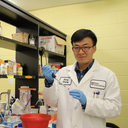Diallyl Disulfide Suppresses the Inflammation and Apoptosis Resistance Induced by DCA Through ROS and the NF-κB Signaling Pathway in Human Barrett's Epithelial Cells.
Keywords
Abstract
Barrett's esophagus (BE) is generally accepted as the only precursor to esophageal adenocarcinoma (EAC). Deoxycholic acid (DCA)-induced inflammation and apoptotic resistance play an important role in the carcinogenesis and progression from BE to EAC. Diallyl disulfide (DADS) is a garlic-derived natural organosulfur compound. This study investigated whether DADS has chemopreventive effects against BE and the potentially related signaling pathway. BAR-T cells were treated with DCA in the presence or absence of DADS. An MTT assay was used to detect the viability of the cells. The apoptosis rate of the cells was measured by light microscopy and flow cytometry. ROS levels were determined by fluorescence microscopy and flow cytometry. Real-time PCR and ELISA were used to detect mRNA and protein levels, respectively. The levels of target proteins were also determined by western blot analysis. DADS did not inhibit cell viability in a certain concentration range. DADS, similar to the NF-κB inhibitor PDTC, inhibited the DCA-induced ROS production, inflammatory factors, IκBα phosphorylation, and expression of p50 in the nucleus in a dose-dependent manner. DADS also increased the cell apoptosis rate through down-regulating the level of Bcl-2. DADS has low cytotoxicity in BAR-T cells. It has an anti-inflammatory effect in BAR-T cells through inhibiting ROS and the NF-κB signaling pathway. Further, it abolishes the apoptotic resistance induced by DCA in an NF-κB/Bcl-2 dependent manner. DADS may be a good candidate for BE and EAC chemical prevention and therapy.







